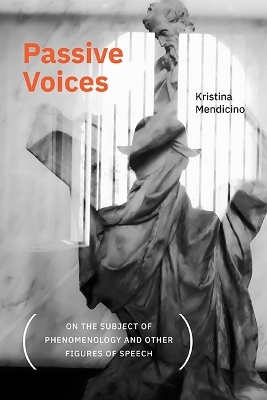
Passive Voices (On the Subject of Phenomenology and Other Figures of Speech)
Seiten
2023
State University of New York Press (Verlag)
978-1-4384-9196-7 (ISBN)
State University of New York Press (Verlag)
978-1-4384-9196-7 (ISBN)
Addresses the question of how language affects the subject of speech through readings of confessional, philosophical, and fictional writings.
At least since Aristotle's Peri hermeneias, there has been talk of the pathos of language, of language as "symbols of the affections in the soul." The way these affections are registered, however, suggests that they are themselves structured like language. For Aristotle and others, language is suffered before any sense can be voiced. The pathos of language thus becomes a question of how language affects the subject of speech and, in the last analysis, of how language could respond to these questions of language. Passive Voices (On the Subject of Phenomenology and Other Figures of Speech) approaches these questions, first, through readings of Augustine's investigations into language and mind and Edmund Husserl's descriptions of passive synthesis. It then traces the further resonance of Augustine's and Husserl's interventions in selected literary experiments by Georges Bataille, Franz Kafka, and Maurice Blanchot that recall Husserl and Augustine while exceeding the restrictive fictions of phenomenological "science." In drawing out the echoes that emerge across confessional, philosophical, and fictional writings, this book exposes the ways in which speech occurs in the passive voice and affects any claim to experience.
At least since Aristotle's Peri hermeneias, there has been talk of the pathos of language, of language as "symbols of the affections in the soul." The way these affections are registered, however, suggests that they are themselves structured like language. For Aristotle and others, language is suffered before any sense can be voiced. The pathos of language thus becomes a question of how language affects the subject of speech and, in the last analysis, of how language could respond to these questions of language. Passive Voices (On the Subject of Phenomenology and Other Figures of Speech) approaches these questions, first, through readings of Augustine's investigations into language and mind and Edmund Husserl's descriptions of passive synthesis. It then traces the further resonance of Augustine's and Husserl's interventions in selected literary experiments by Georges Bataille, Franz Kafka, and Maurice Blanchot that recall Husserl and Augustine while exceeding the restrictive fictions of phenomenological "science." In drawing out the echoes that emerge across confessional, philosophical, and fictional writings, this book exposes the ways in which speech occurs in the passive voice and affects any claim to experience.
Kristina Mendico is Associate Professor of German Studies at Brown University. She is the author of Announcements: On Novelty, also published by SUNY Press, and Prophecies of Language: The Confusion of Tongues in German Romanticism.
Acknowledgments
Introduction: Principally Unprincipled; or, Speaking of “Beginnings”
1. “Self” -Citations in Husserl and Augustine
2. Provocations: “I,” Husserl, and the Passive Voices of Phenomenology
3. Parsing Pairing: George Bataille and the Scripts of Subjectivity
4. Writing Out of Sight: On the Papers and Traces of Kafka
5. Passive Voices: Echoes, Blanchot
Postscript
Notes
Works Cited
Index
| Erscheinungsdatum | 04.08.2023 |
|---|---|
| Reihe/Serie | SUNY series, Intersections: Philosophy and Critical Theory |
| Zusatzinfo | Total Illustrations: 0 |
| Verlagsort | Albany, NY |
| Sprache | englisch |
| Maße | 152 x 229 mm |
| Gewicht | 227 g |
| Themenwelt | Geisteswissenschaften ► Philosophie ► Philosophie der Neuzeit |
| Geisteswissenschaften ► Sprach- / Literaturwissenschaft ► Anglistik / Amerikanistik | |
| Geisteswissenschaften ► Sprach- / Literaturwissenschaft ► Literaturwissenschaft | |
| ISBN-10 | 1-4384-9196-4 / 1438491964 |
| ISBN-13 | 978-1-4384-9196-7 / 9781438491967 |
| Zustand | Neuware |
| Informationen gemäß Produktsicherheitsverordnung (GPSR) | |
| Haben Sie eine Frage zum Produkt? |
Mehr entdecken
aus dem Bereich
aus dem Bereich


